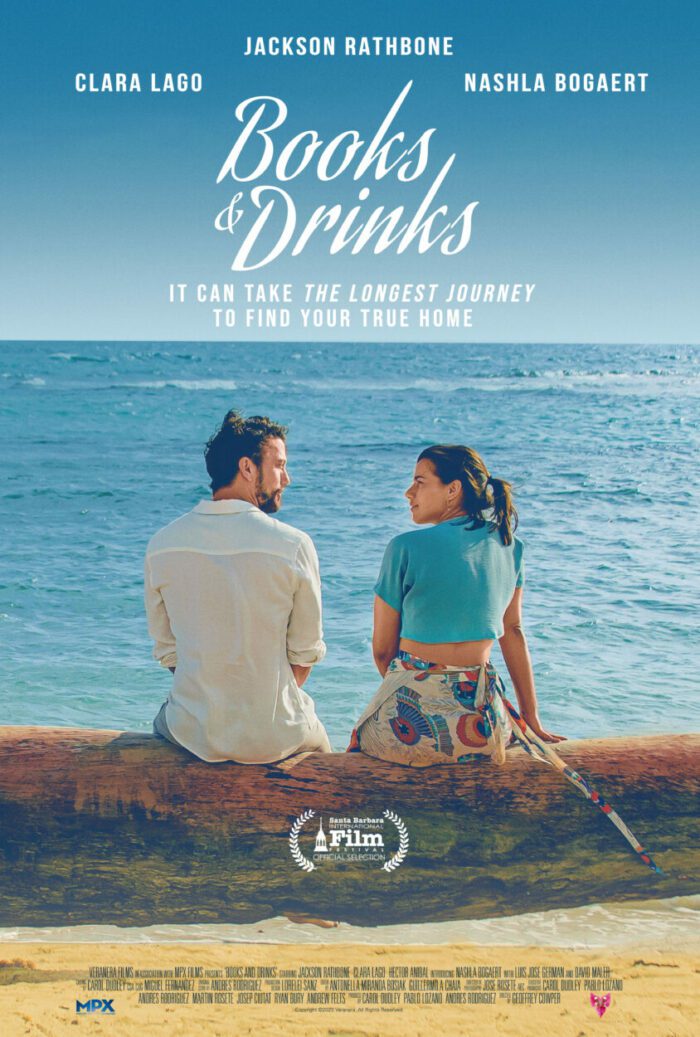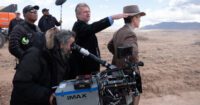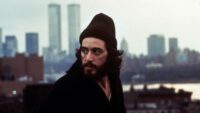With his new film Books & Drinks, having recently premiered at the Santa Barbara International Film Festival, director Geoffrey Cowper is working to resuscitate the rom-com genre, harking back to its 1990s heyday with a sunny tale of a romantic triangle set in the Dominican Republic. With its bright blue skies, charismatic cast, and effervescent charm, Books & Drinks offers up more than a few laughs and a romantic connection: at its core, it’s a coming-of-age film, one in which its protagonist seeks to make peace with his past and find his way to a self-fulfilling future. In other words, there’s more to life than just laughs and love; there’s meaning and purpose as well.
Half Australian and half Spanish, Geoffrey Cowper was born in Terrassa, Barcelona, Spain and studied at Escola Superior de Cinema i Audiovisuals de Catalunya. His short film Snails! earned him the Best Director Award at Festival Internacional Ópera Prima en Corto de Granada (Spain) in 2011. He has directed other short films and, in 2015, the independent thriller Day Release (Tercer Grado). Books & Drinks, from a screenplay by Josep Ciutat, is his second full-length feature film.
Cowper spoke to Film Obsessive publisher J Paul Johnson shortly after the world premiere of Books & Drinks. Scroll below the video for a slightly edited transcript of the conversation.
Film Obsessive: Geoffrey, you are joining us from Spain today?
Geoffrey Cowper: That’s correct. From a little town near Barcelona.
And could you tell us a little bit about the plot of your film Books & Drinks?
Well, Books and Drinks is a rom-com. And it’s a story of David (Jackson Rathbone), a bookstore owner in Brooklyn, who has a failing bookstore. And suddenly one day his mother comes in and tells him that the father, whom he thought had died a long time ago, was actually living a secret life in the Dominican Republic, but now has died of a heart attack and has left him, in his will, his house in the Caribbean. So this is the set up and this is the kind of inciting incident for David’s journey in life when he has to go down there and sell his house, his father’s house. And through that he will try to save his bookstore.
But obviously this is kind of a McGuffin to kind of do a character’s-arc kind of film journey: a hero’s journey of this guy discovering that maybe he’s not living the life he should be living. And it tries to inspire you to fight for what is it that we want to do in life, for what is it that we want to do professionally. And maybe if we are with the person that we were meant to be, and if not, then fight to be with that person.
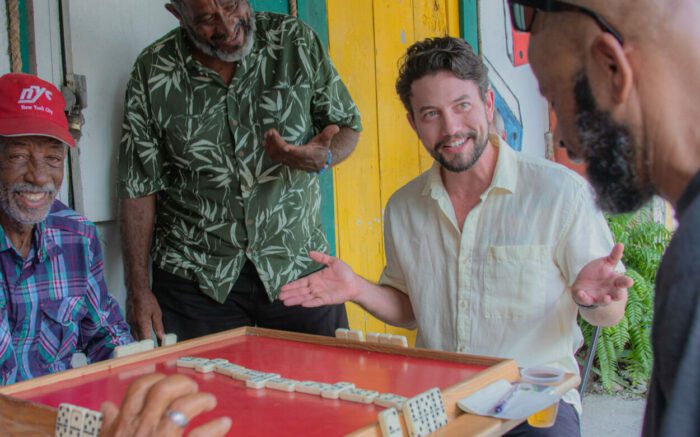
There’s a little bit of a romantic triangle then, if you will, as David is on that journey. And there are a few obstacles for him along that path as well, right?
Yes, yes, yes. Obviously, there’s a lot of obstacles because, yes, things will kind of turn upside down once he gets down there. And he will meet the real estate agent, Maria, who’s this lovely actress, Nashla Bogaert from the Dominican Republic. And well, there will be this instant chemistry between the two of them. But then there’s the other girlfriend, Rachel, who’s played by Clara Lago, the Spanish actress. And yes, that sets up the love triangle. And he will get caught in a few complicated situations, but it’s all for the fun of it. And yeah, it becomes a bit tense, but hilarious, at the same time. And yet, he will have to make a life decision, to decide with whom he wants to be.
I’m reading your press notes for the film and it really sounds like a lovely production. I can tell when watching the film that it’s just infused with good humor and goodwill throughout. When were you shooting? And can you tell us a little bit about where you were doing this work as well?
I first went down to the Dominican Republic in June 2021 to meet the producers and to see some locations. And I was mesmerized by the locations and the scenery of the country, it’s just beautiful and spectacular. Then I went back there in October 2021 to start prepping for the film. And so we started doing location scouting in Santo Domingo, which is like the south part of the island, the capital. But there were some beaches and some kind of forests that I really wanted to find. So that took us up north into Samana, which is a beautiful kind of beach area that has an incredible beach just in front of the Atlantic. And there were some spectacular forests too with the views of that greenery and those huge trees.
And then obviously, it was all about finding the house—the house that David is trying to sell, the house, that is itself a character in the movie, his father’s house. And we had to look for a few houses, but then one day we went driving an hour north from Santo Domingo and we found this house that had this crazy view of this jungle, this forest, this super green forest just behind the swimming pool. And I thought it was just mind blowing and I thought that is it. And also the location manager, Gregory Del Valle, told me that that was the house that David Fincher was staying in while he was doing location scouting for The Killer. And I thought if Fincher has stayed here, I’m shooting here, you know.
It is a beautiful location and it works perfectly within the plot. And I’m also assuming that you might have all been able to enjoy yourself while you were there.
Yeah, yeah, yeah, it’s your typical location in which they tell you that nobody can swim in the swimming pool besides the actors. But then you find the AD suddenly in a swimsuit, kind of cooling his thoughts, you know, while dipping for a little while in the water. Or we had an amazing costume designer, she was pregnant and she was like, I can’t leave this location without having a swim before we leave. So everyone was kind of enjoying the house.
I asked if I could sleep there, you know, to kind of work on my shot list and kind of, but they told me we couldn’t stay there. But I remember, well, in the Dominican Republic, the sun rises at 6:00 a.m. and it sets at 6:00 p.m. every day throughout the year. So we were there every day for like two weeks in that house, like at 4:30 a.m.. So we imagine those sunrises in that place, they were just lovely. It was just a treat, just before we started prepping for the shots. Just the sunrise in that location was amazing.
In the script for the film, which I’ll ask you to talk about a little bit, did the house, the estate, always play this big of a role? And was it always quite that central to the film’s plot?
I think originally Josep Ciutat’s script, he had this vision that for him, the house wasn’t so important for the plot. For some reason, maybe it’s because I was also buying my house back then when we shot and I was struggling through the mortgage and your real estate agents and all of that, I thought it was important for me to give it its weight in the movie in a pivotal way. It is a McGuffin selling the house for the whole plot.
But somehow we also will see, I don’t know if I can say any give away spoilers, but for Maria, it’s complicated for her because she knew this house. She knew David’s father, though David never knew the house or his father. And she doesn’t want to sell the house to any kind of rich guy that will come and buy it. She wants somebody who will appreciate the house. So she will lie in the middle of that and then David will catch that lie. He will see that she hasn’t been totally honest, that it will create a conflict between them two. She will have to come clean and then she will have to kind of eventually work hard on making sure that she can sell that house.
No, it wasn’t as crucial in the original script and that was one of those healthy arguments that you have with a writer. But somehow I felt that it needed a couple more scenes. I still have my doubts if it was so important. But, you know, it’s your typical writer-director creative argument.
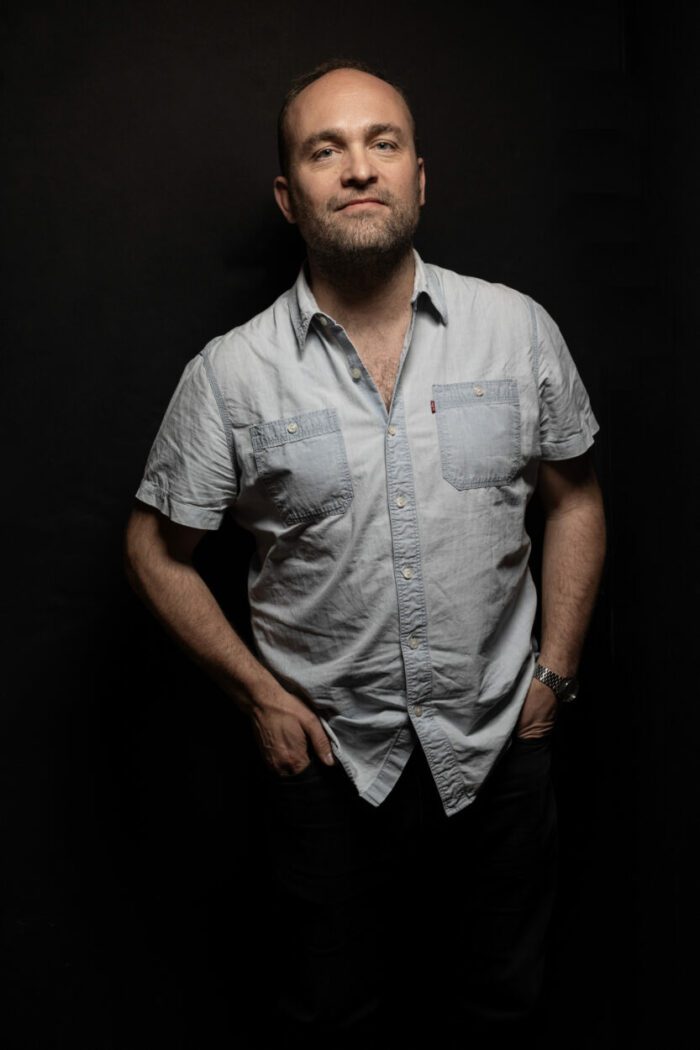
And was it the genre that brought you to that script in the first place? Did you have a desire to make a rom-com and then were looking about and then saw this particular script, or was it just the script that kind of pulled you into the rom-com genre?
Good question! I mean, when I graduated from film school, my final career project was a sci-fi rom-com. It was a romantic comedy based on my adolescent years with a giant killer snail. Okay. Which is a bit crazy. But it was a movie that I made from my heart, and it was a rom-com, but with kind of a sci-fi twist. After that, I wrote a rom-com that also was very personal to me that I wanted to direct. And I did a teaser for it. But at that day, like ten years ago in Spain, that project was left behind, and then I did my first feature (Day Release) was like a crime thriller. A drama thriller, you know, based on real events.
Luckily once that film was released and did the whole film festival circuit, Martin Rosetta, a producer, saw it. And he was like, if you’ve done this for $50k, you should meet my writer friend because he has a project that I think you would be good for now. And that’s how I met Josep (Ciutat). That was 2016. It makes you think how long it takes to make a movie, even like a simple movie, like Books and Drinks. But you need to get all of the pieces in the mix. And I loved the script when I read it, you know, I thought the premise was, I mean, maybe not the most original premise, but I really like the characters that Josep wrote and how they spoke. And it was witty and it was fast paced. And it reminded me of that kind of ’90s Hollywood rom-coms, the indie ones that I love. And I thought this has a lot of potential and we were working on that for years while doing other jobs and other projects.
Finally, thanks to Carol Dudley, who’s the producer on Books and Drinks, we decided to take the films to the Dominican Republic. Thanks to a great kind of tax incentive law that they have right now, and that’s how it came up. But I love rom-coms. I think they’re underrated, and I think we should aware of how tricky it is to make a good rom-com. And I struggled, but I had a lot of fun doing it and had a lot of fun rehearsing with the actors, trying to find always the truthfulness of the situations, the characters, but then finding that kind of fun to it, the sweetness and spontaneity.
I think in Books & Drinks, we get the romance, we get the comedy, but we also get a little bit of meaning at the end. And you began part of this discussion by talking a little bit about David’s as being something of a hero’s journey. And he does, through those romantic interactions and through those comedic moments, arrive at a destination that’s not just a beautiful house in the Caribbean, but an opportunity for him to learn a little bit more about himself, a little bit more about his lineage, and a little bit more about what it was that drew his father to that place in his past.
Yeah, totally. We tried to start, you know, as a comedy with fun situations in the bookstore with David and Michael (his co-worker, played by David Maler), with their dynamics. They’re talking about books and the customers and the fact that nobody goes in just to use the toilet. And the relationship with his mother (Carol Halstead) and all that. But I wanted to slowly switch from that to romance once Maria comes into the movie and we have that kind of meet-cute. They meet, obviously there’s an instant kind of chemistry. And then there’s certain situations that kind of lead up to that. Going to the beach, dancing, talking, even when she throws him into the pool and gets caught by his actual girlfriend who just arrives in that moment.
But then, you know, I want to kind of plant all these kind of situations in which David is progressively studying the house or getting to know his father’s study. And first of all, we see how he looks at it from a distance. Then he walks in, plays the piano, starts finding pictures of his past. Starts realizing through the people that his father knew, and the people that actually live in the house like, well the chef Pablo (Luis José Germán) and Laura (Katherine Montes) who would take care of the house, things about his father, and that is our way to break those layers that David is hiding from himself, to actually realize that his father was living a life that he’s not.
So he gets inspired by that father figure that he never knew. And has this internal debate of, am I living the life that I should be living? Is my life comfortable or should I fight for a more memorable one? And through that, and through finding love and finding a bit of himself, and following the steps of his father inside of the house, like drinking in his father’s room, playing his father’s piano, swimming in his father’s pool, walking in his father’s shoes. He discovers something of himself that he didn’t know.
He didn’t want to make [his life] too dramatic. But I think in life, comedy and drama are just a frame away. You know, you can be laughing at something and suddenly, drama hits the door. And that was one of the things I tried to do in the movie. Switch those gears from comedy to drama and then back to comedy. Not a kind of crazy comedy, not over-the-top comedy, but subtle comedy. You know, luckily [at the film’s premiere] in Santa Barbara, people laughed and that made me very happy. Because for a filmmaker, one of the best feelings you can get when an audience is laughing, when you want them to laugh. But at least I think it’s a movie that will make people smile and feel good. And once you’ve done with the movie, I think it’s a good moment to feel good, and this movie will actually shed some light into the darkness that the world is sometimes or too often in.
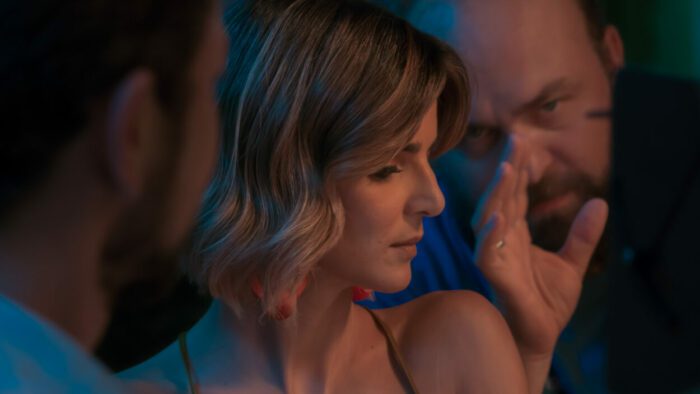
You’re back from Santa Barbara. Is Barcelona the next stop on the festival circuit?
Barcelona, next stop! There’s this very nice festival in Barcelona, the Barcelona Film Festival. It’s in April. We have a screening there the 24th, we’re an official selection, and I can’t wait for people to see it here in Spain. I’m looking forward to taking notes on how the audience will react here, because it’s incredible how audiences react differently depending on the culture of the country. And I find that American audiences are very engaged by the movies, and I love that and I really appreciate it. You know, maybe Europeans are a bit colder about their reactions. And it’s something that I’ll miss once I screen it here, but who knows?
And then after that, we want to have a premiere in some festivals in the Dominican Republic. Obviously, before there is a theatrical release there, I guess at the end of this year, we’re looking at other film festivals. You know, I would love to go to more North American film festivals in the States and Canada. We’re thinking about submitting maybe the Woodstock Film Festival, which I’ve heard great things about. And we could, I would love to have like an East Coast premiere, and since the opening of the movie happens in New York, and New York is one of my favorite cities in the world. I would love to be able to have the film screening somewhere there. I would love to push the film because right now we have a sales agent, MPX, but we don’t know exactly what the distribution will be or on what platform people will be able to see it. I love the fact that the film has a life of its own in film festivals at least during 2024.
That’s exciting for people to look forward to. Geoff, thank you for taking your time to speak with us this morning. Congratulations on the success of the film so far. And wishing you the best for excellent future for Books & Drinks.
Thank you so much, Paul. It’s been a pleasure to be here with Film Obsessive. I love what you’re doing. I’m looking forward to seeing the interview and everything. It’s been a pleasure to be here.
